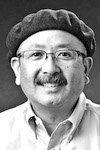
Gil Asakawa
It feels like I’ve attended a lot of funerals and memorial services this year — more than in the past. I can sense the JA community’s combined generational memory fading with each ceremony. But in this holiday season, I’m hopeful that the legacy of our members can be preserved, as a fitting tribute to our forebears’ experience.
I recently attended a service for 91-year-old Tom Koshio, a wonderful, kind man who was a constant presence in Denver’s Japanese American community. My wife, Erin Yoshimura, knew Tom’s family growing up, and she and I had some great conversations with him. He joined the U.S. Army near the end of World War II and served in the Military Intelligence Service during the U.S. Occupation of Japan because he could speak Japanese.
Well, sort of, anyway. He loved to tell the story of how he was recruited into the MIS: He was interviewed by an officer for his ability to speak Japanese, who then pointed to a pencil and said, “What’s that?” “Kore wa empitsu desu (this is a pencil),” Tom said in basic Japanese. He passed the test, as far as Uncle Sam was concerned.
After his military service, Tom raised a family in Denver, and most folks in the community remember him as someone who placed family first. Tom’s family members told moving stories about his deep sense of decency and kindness. He was always smiling at every event when we saw him. I mentioned his genial nature to one of his kids, who replied that Tom knew when to be a “dragon dad.”
Outside of his family, we knew Tom as a proud veteran. He always attended the annual Nisei Memorial Day Service in full uniform (he helped with lowering the flag to half-mast and raising it after the ceremony), even as he became more frail over the years.
To pay tribute to his service to the country, his funeral, which was held at the Tri-State Denver Buddhist Temple, featured a presentation of colors by a military honor guard. It occurred to me that this was the first time I had seen a military presentation at the Buddhist temple.
Then, I remembered my first-ever Buddhist funeral, which was the first time I had seen the U.S. military pay tribute to the deceased: my dad.
I was already an adult and had not even attended many Christian funerals, when my father died of cancer. His service wasn’t at the Denver Buddhist Temple, though. It was at a funeral home, and both the Buddhist minister and military officers were there. That was in 1992.
He was not even 59 years old. Like Tom Koshio, he was a veteran who served in Japan during the post-war Occupation in the Counter Intelligence Corps. His job was to interrogate Japanese soldiers returning to the country who had been prisoners of war and ferret out Communist sympathizers and spies.
Like Tom, he could speak Japanese. His story will fill a book someday; it’s a project I started researching before he died.
Growing up, my dad never talked about his youth. I didn’t even know that he and his family had been stuck in Japan during the war, and he became a houseboy for American troops afterwards until he was old enough to enlist. He went on to serve during the Korean war and met my mom when he was stationed in Hokkaido.
The men who served in the MIS and CIC seldom spoke about their role during and after the war against Japan. Unlike the 442nd Regimental Combat Team, they were told their mission was secret, and they kept it that way for decades. No headlines during the war celebrated their efforts helping the Allies advance in the Pacific like the media coverage of the “Go For Broke” troops battling across Europe.
When my dad was diagnosed with lung cancer (he began smoking when he was a teenager because the U.S. Army gave him a free carton of Lucky Strikes until he died), I finally asked him, “Hey, dad what was it like being at Pearl Harbor?” “I don’t know,” he said.
That’s when I squeezed out the story that he and his Hawaii-born brothers and sisters had been taken to Japan by my grandfather in 1940, and they were stuck there during the war.
When my dad died, he had served in the Army Reserves for decades, yet we had no idea that he was very involved in negotiations between Japan and Russia over disputed territories in the north. An officer from D.C. pinned a Legion of Merit medal on his chest that day at the funeral. Tom Koshio was given the Congressional Gold Medal for his service along with other Nisei veterans, and he was always modest about the honor.
That’s the kind of legacy that the generations before us have held on to. Some have passed their stories on to younger generations, but others haven’t. I’m glad I learned my father’s story — much of it from my relatives both in the U.S. and in Japan after he passed away — and feel the responsibility to keep it alive.
Our community does a pretty good job of holding on to both the ups and downs of our shared past experience. I for one am committed to making sure the legacy of our parents and grandparents is given the respect they deserve.
Happy holidays, everyone. See you next year!
Gil Asakawa is former chair of the Pacific Citizen Editorial Board and author of “Being Japanese American” (Second Edition, Stone Bridge Press, 2015). He blogs at www.nikkeiview.com.



